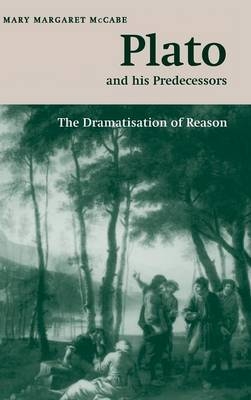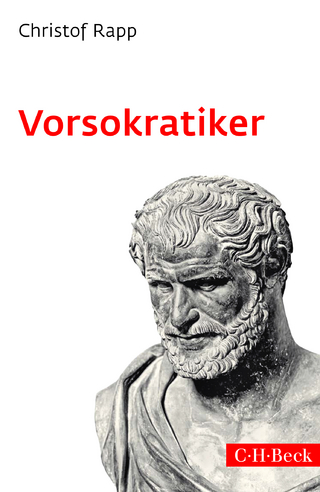
Plato and his Predecessors
The Dramatisation of Reason
Seiten
2000
Cambridge University Press (Verlag)
978-0-521-65306-0 (ISBN)
Cambridge University Press (Verlag)
978-0-521-65306-0 (ISBN)
A consideration of how Plato represents his philosophical predecessors. These predecessors appear in imaginary conversations; and they are refuted when they fail to defend their philosophical positions in debate. Professor McCabe argues that Plato's reflections on these conversations allow him to develop a new account of the principles of reason.
How does Plato view his philosophical antecedents? Plato and his Predecessors considers how Plato represents his philosophical predecessors in a late quartet of dialogues: the Theaetetus, the Sophist, the Politicus and the Philebus. Why is it that the sophist Protagoras, or the monist Parmenides, or the advocate of flux, Heraclitus, are so important in these dialogues? And why are they represented as such shadowy figures, barely present at their own refutations? The explanation, the author argues, is a complex one involving both the reflective relation between Plato's dramatic technique and his philosophical purposes, and the very nature of his late philosophical views. For in these encounters with his predecessors we see Plato develop a new account of the principles of reason, against those who would deny them, and forge a fresh view of the best life - the life of the philosopher.
How does Plato view his philosophical antecedents? Plato and his Predecessors considers how Plato represents his philosophical predecessors in a late quartet of dialogues: the Theaetetus, the Sophist, the Politicus and the Philebus. Why is it that the sophist Protagoras, or the monist Parmenides, or the advocate of flux, Heraclitus, are so important in these dialogues? And why are they represented as such shadowy figures, barely present at their own refutations? The explanation, the author argues, is a complex one involving both the reflective relation between Plato's dramatic technique and his philosophical purposes, and the very nature of his late philosophical views. For in these encounters with his predecessors we see Plato develop a new account of the principles of reason, against those who would deny them, and forge a fresh view of the best life - the life of the philosopher.
Preface; 1. Introduction; Part I. The Opponents: 2. Measuring sincerity; 3. Missing persons; 4. Can the Heraclitean live his Heracliteanism?; Part II. Teleology: 5. Myth and its end; 6. Outwitting the cunning man; Part III. Reason and the Philosopher: 7. Tracking down the philosopher; 8. The sufficiency of reason; 9. Meeting Socrates' challenge; Bibliography; General index; Index locorum.
| Erscheint lt. Verlag | 15.8.2000 |
|---|---|
| Reihe/Serie | The W. B. Stanford Memorial Lectures |
| Verlagsort | Cambridge |
| Sprache | englisch |
| Maße | 152 x 229 mm |
| Gewicht | 650 g |
| Themenwelt | Geisteswissenschaften ► Philosophie ► Philosophie Altertum / Antike |
| ISBN-10 | 0-521-65306-1 / 0521653061 |
| ISBN-13 | 978-0-521-65306-0 / 9780521653060 |
| Zustand | Neuware |
| Informationen gemäß Produktsicherheitsverordnung (GPSR) | |
| Haben Sie eine Frage zum Produkt? |
Mehr entdecken
aus dem Bereich
aus dem Bereich
mit Sokrates, Seneca, Platon & Co. im Gespräch
Buch | Hardcover (2023)
FinanzBuch Verlag
CHF 25,20


